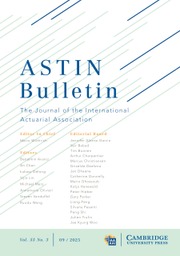Crossref Citations
This article has been cited by the following publications. This list is generated based on data provided by Crossref.
Lu, Qiang
Liu, Beini
and
Song, Hua
2020.
How can SMEs acquire supply chain financing: the capabilities and information perspective.
Industrial Management & Data Systems,
Vol. 120,
Issue. 4,
p.
784.
Song, Hua
2021.
Smart Supply Chain Finance.
p.
587.
Lu, Qiang
Chen, Jinliang
Song, Hua
and
Zhou, Xiangyu
2022.
Effects of cloud computing assimilation on supply chain financing risks of SMEs.
Journal of Enterprise Information Management,
Vol. 35,
Issue. 6,
p.
1719.
Qiao, Ruilei
and
Zhao, Lindu
2023.
Reduce supply chain financing risks through supply chain integration: dual approaches of alleviating information asymmetry and mitigating supply chain risks.
Journal of Enterprise Information Management,
Vol. 36,
Issue. 6,
p.
1533.


